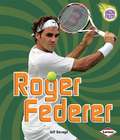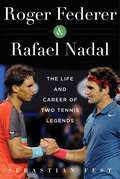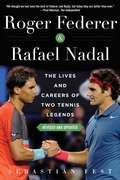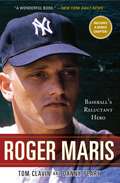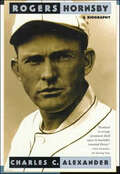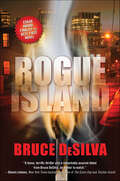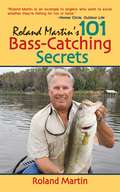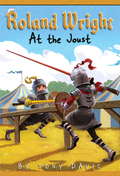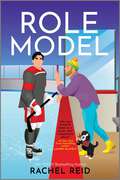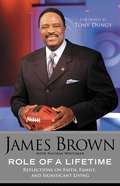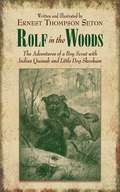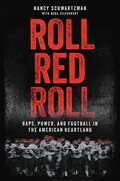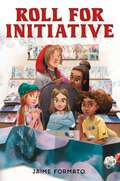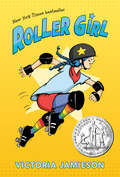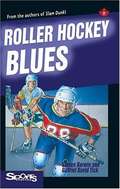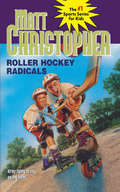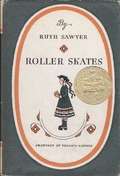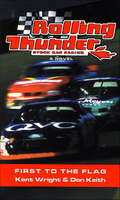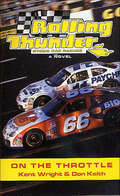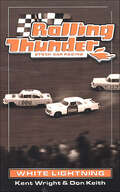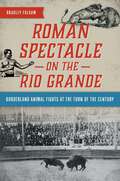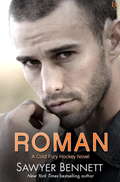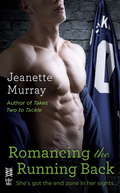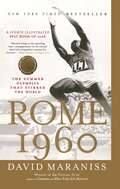- Table View
- List View
Roger Federer and Rafael Nadal: The Lives and Careers of Two Tennis Legends
by Sebastián FestSince 2004, two names have dominated men's tennis: Rafael Nadal and Roger Federer. Each player is legendary in his own right. The Spanish Nadal is the winner of fourteen Grand Slam titles, including five consecutive French Open singles titles from 2010 to 2014, and is the only player ever to win a Grand Slam for ten straight years. Federer, from Switzerland, has spent over three hundred weeks of his career ranked as the number-one player in the world and has won seventeen Grand Slam titles and two Olympic medals. But neither player's career would have been nearly as successful without the decade-long rivalry that pushed them to excel to the peak of tennis excellence. Nadal and Federer have met thirty-four times over the course of their careers, and have shared the distinction of being ranked the two best players in the world for an astounding six years in a row from 2005 to 2009. In Roger Federer and Rafael Nadal, international sports journalist Sebastian Fest uses information gleaned from his numerous interviews with both players over the last decade to narrate the rivalry, and its impact not only on the players, but on the sport itself. Documenting their respective wins and losses, hopes and disappointments, and their relationship with their rival, Fest formulates a unique biography of two of the greatest players of tennis.
Roger Federer and Rafael Nadal: The Lives and Careers of Two Tennis Legends
by Sebastián FestSince 2004, two names have dominated men’s tennis: Rafael Nadal and Roger Federer. Each player is legendary in his own right. The Spanish Nadal is the winner of sixteen Grand Slam titles, including five consecutive French Open singles titles from 2010-2014, and is the only player ever to win a Grand Slam for ten straight years. Federer, from Switzerland, has spent over three hundred weeks of his career ranked as the number-one player in the world and has won twenty Grand Slam titles and two Olympic medals. But neither player’s career would have been nearly as successful without the decade-long rivalry that pushed them to rise to the peak of tennis excellence. Nadal and Federer have met thirty-eight times over the course of their careers, and have shared the distinction of being ranked the two best players in the world for an astounding six years in a row from 2005-2009. In Roger Federer and Rafael Nadal, international sports journalist Sebastian Fest uses information gleaned from his numerous interviews with both players over the last decade to narrate the rivalry, and its impact not only on the players, but on the sport itself. Documenting their respective wins and losses, hopes and disappointments, and relationships with their rivals, Fest formulates a unique biography of two of the greatest players of tennis. Skyhorse Publishing, as well as our Sports Publishing imprint, is proud to publish a broad range of books for readers interested in sports-books about baseball, pro football, college football, pro and college basketball, hockey, or soccer, we have a book about your sport or your team. In addition to books on popular team sports, we also publish books for a wide variety of athletes and sports enthusiasts, including books on running, cycling, horseback riding, swimming, tennis, martial arts, golf, camping, hiking, aviation, boating, and so much more. While not every title we publish becomes a New York Times bestseller or a national bestseller, we are committed to publishing books on subjects that are sometimes overlooked by other publishers and to authors whose work might not otherwise find a home.
Roger Maris: Baseball's Reluctant Hero
by Danny Peary Tom ClavinThe definitive biography of the baseball legend who broke Babe Ruth's single-season home-run record--the natural way--and withstood a firestorm of media criticism to become one of his era's preeminent players. ROGER MARIS may be the greatest ballplayer no one really knows. In 1961, the soft-spoken man from the frozen plains of North Dakota enjoyed one of the most amazing seasons in baseball history, when he outslugged his teammate Mickey Mantle to become the game's natural home-run king. It was Mantle himself who said, "Roger was as good a man and as good a ballplayer as there ever was." Yet Maris was vilified by fans and the press and has never received his due from biographers--until now. Tom Clavin and Danny Peary trace the drama-tic arc of Maris's life, from his boyhood in Fargo through his early pro career in the Cleveland Indians farm program, to his World Series championship years in New York and beyond. At the center is the exciting story of the 1961 season and the ordeal Maris endured as an outsider in Yankee pinstripes, unloved by fans who compared him unfavorably to their heroes Ruth and Mantle, relentlessly attacked by an aggressive press corps who found him cold and inaccessible, and treated miserably by the organization. After the tremendous challenge of breaking Ruth's record was behind him, Maris ultimately regained his love of baseball as a member of the world champion St. Louis Cardinals. And over time, he gained redemption in the eyes of the Yankee faithful. With research drawn from more than 130 interviews with Maris's teammates, opponents, family, and friends, as well as 16 pages of photos, some of which have never before been seen, this timely and poignant biography sheds light on an iconic figure from baseball's golden era--and establishes the importance of his role in the game's history.
Rogers Hornsby: A Biography
by Charles C. AlexanderA relentless competitor, Rogers Hornsby--arguably the finest right-handed hitter in baseball's history--was supremely successful on the baseball field but, in many ways, a failure off it. In this biography, Charles Alexander turns his skilled eye to this complex individual, weaving the stories of his personal and professional life with a lively history of the sport.
Rogue Island (Liam Mulligan #1)
by Bruce DeSilva2011 Edgar Award Winner for Best First NovelLiam Mulligan is as old school as a newspaper man gets. His beat is Providence, Rhode Island, and he knows every street and alley. He knows the priests and prostitutes, the cops and street thugs. He knows the mobsters and politicians—who are pretty much one and the same.Someone is systematically burning down the neighborhood Mulligan grew up in, people he knows and loves are perishing in the flames, and the public is on the verge of panic. With the whole city of Providence on his back, Mulligan must weed through a wildly colorful array of characters to find the truth.At the Publisher's request, this title is being sold without Digital Rights Management Software (DRM) applied.
Roland Martin's 101 Bass-Catching Secrets
by Roland MartinRoland Martin, the most successful bass fisherman in history in terms of tournaments won, is a prolific source of bass fishing wisdom and sure-fire bassing tips. Both practical and discursive, Martin not only discusses why bass strike, how to use live bait, plugs, and spinners, tricks for night fishing, and how to fish logs, weeds, rocks, and trees; he also recounts how he once fished five rods at once during a school feeding frenzy, and how fellow legend Bill Dance charmed him out of a spinnerbait and beat him with it in a tournament. Full of information and great stories, Roland Martin's 101 Bass-Catching Secrets is the best guide available to help fishermen land more bass, and a revealing look at the exciting world of professional fishing.
Roland Wright: At the Joust
by Tony Davis Gregory RogersRoland Wright has been a page at Twofold Castle for just a month and already he has impressed the King's bravest knights. Now Roland is off to his first tournament, where knights from near and far take part in a full day of jousting. He's only meant to be watching. But when the fearsome Little Douglas, a young page from another castle, throws down a challenge, things get serious. All too quickly, Roland is thrust into the action. It's all he can do to just stay on his feet. . . .From the Trade Paperback edition.
Role Model: A Gay Sports Romance (Game Changers #5)
by Rachel ReidUSA TODAY bestselling author Rachel Reid's next Game Changers hockey romance sees a grumpy professional hockey player meet his match in an out-and-proud social media manager…The hits just keep coming for Troy Barrett. Traded to the worst team in the league would be bad enough, but coming on the heels of a messy breakup and a recent scandal… Troy just wants to play hockey and be left alone. He definitely doesn&’t want to &“work on his online presence&” with the team&’s peppy social media manager.Harris Drover can tell standoffish Troy isn&’t happy about the trade, but Harris doesn&’t give up on people easily. Even when he&’s developing a crush he&’s sure is one-sided. And when he sees Troy&’s smile finally crack through his grumpy exterior… That&’s a man Harris couldn&’t turn his back on if he wanted to.Suddenly, Troy&’s move to the new team feels like an opportunity—for Troy to embrace his true self, and for both men to explore their growing attraction. But being together behind closed doors is one thing, and for Troy, being in a public relationship with Harris will mean facing off with his fears, once and for all.Need more Reid? Don't miss The Shots You Take—a sweet and sexy hockey romance about two ex-best friends with benefits who are about to discover whether you can ever really have a second chance. Available now!Game Changers Book 1: Game Changer Book 2: Heated Rivalry Book 3: Tough Guy Book 4: Common Goal Book 5: Role Model Book 6: The Long Game
Role of a Lifetime: Reflections on Faith, Family, and Significant Living
by Tony Dungy Nathan Whitaker James BrownWe live in a world that all too often operates under the overriding template of self-promotion, embracing a "hooray for me" attitude, and which measures success in increasingly small timeframes dotted with markers of temporal value. Millions of viewers know James Brown as a sports commentator and former athlete. With ROLE OF A LIFETIME , James reveals a different side of his character. Brown rose from a middle-class home to earn a scholarship to Harvard and a chance at a professional sports career before moving on to broadcast journalism. Part memoir and part self-help, this book draws on James's lessons from his faith and life experiences to guide readers to find fulfillment and significance. He offers values and encouragement to others of all generations, assisting them in their search for meaning in navigating a world that increasingly promotes transient values, if any at all. His message that shortcuts and gimmicks are counterproductive to a person's success provides hope that there is a God who cares about them and their futures.
Rolf in the Woods: The Adventures of a Boy Scout with Indian Quonab and Little Dog Skookum
by Ernest Thompson SetonSet at the beginning of the nineteenth century, Rolf in the Woods follows a young boy on his journey to becoming a man, learning how to live in the wilderness, respecting animals and nature, and fighting amongst his brethren in war. When his mother passes away, fifteen-year-old Rolf goes to live with his aunt and uncle on their farm. But his aunt's constant scolding and his uncle's drunken violence make living in this new home unbearable for the gentle boy, and he runs away to live in a wigwam with Quonab, a Native American, and his trusty dog Skookum, who teach the boy how to live off the land, hunt, gather, and understand wild creatures. These newfound skills come into play when Rolf must participate in the War of 1812, and he is able to survive by relying on the wisdom the Indian has shared with him. Rolf in the Woods is not only an adventure story but also a guide that teaches young men how to thrive in the outdoors. Ernest Thompson Seton, an avid outdoorsman, provides vivid descriptions of Quonab's lessons, like making a bed with logs, constructing a tom-tom, distinguishing the calls of animals, and making a bow and arrow, and includes over 200 hand-drawn illustrations to make these lessons come to life.
Roll Red Roll: Rape, Power, and Football in the American Heartland
by Nancy Schwartzman**A New York Times Book Review Editor's Choice selection** An incisive narrative about a teen rape case that divided a Rust Belt town, exposing the hostile and systemic undercurrents that enable sexual violence, and spotlighting ways to make change. In football-obsessed Steubenville, Ohio, on a summer night in 2012, an incapacitated sixteen-year-old girl was repeatedly assaulted by members of the &“Big Red&” high school football team. They took turns documenting the crime and sharing on Facebook, Twitter, and YouTube. The victim, Jane Doe, learned the details via social media at a time when teens didn&’t yet understand the lasting trail of their digital breadcrumbs. Crime blogger Alexandria Goddard, along with hacker collective Anonymous, exposed the photos, Tweets, and videos, making this the first rape case ever to go viral and catapulting Steubenville onto the national stage. Filmmaker Nancy Schwartzman spent four years embedded in the town, documenting the case and its reverberations. Ten years after the assault, Roll Red Roll is the culmination of that research, weaving in new interviews and personal reflections to take readers beyond Steubenville to examine rape culture in everything from sports to teen dynamics. Roll Red Roll explores the factors that normalize sexual assault in our communities. Through inter-views with sportswriter David Zirin, victim&’s rights attorney Gloria Allred and more, Schwartzman untangles the societal norms in which we too often sacrifice our daughters to protect our sons. With the Steubenville case as a flashpoint that helped spark the #MeToo movement, a decade later, Roll Red Roll focuses on the perpetrators and asks, can our society truly change?
Roll for Initiative
by Jaime FormatoPerfect for fans of Dungeons & Dragons, Raina Telgemeier, and Jessica Kim, a heartfelt coming-of-age middle grade novel about finding your voice and believing in your best geeky self. Riley Henderson has never taken a bus to school in her entire life. Or made an afterschool snack, or finished her homework on her own, or—ewww—done her own laundry. That&’s what her older brother Devin was for.But now Devin&’s gone. He&’s off in California attending a fancy college gaming program while Riley is stuck alone in Florida with her mom. That is, until a cool nerd named Lucy gives Riley no choice but to get over her shyness and fear of rejection and become friends. The best part is . . . both girls are into Dungeons & Dragons. In fact, playing D&D was something Riley and Devin used to do together, with Devin as the dungeon master, guiding Riley through his intricately planned campaigns. So, of course, Riley is more than a little nervous when Lucy suggests that she run a campaign for them. For the chance at a friend, though, she&’s willing to give it a shot. Soon, their party grows and with the help of her new D&D friends, Riley discovers that not only can she function without Devin, she kind of likes it. She figures out that bus thing, totes the clothes down to the laundry room and sets up her D&D campaigns right there on the slightly suspect folding table, makes her own snacks and dinner— the whole deal. But when Devin runs into trouble with his program and returns home, it's pretty clear, even to Riley, that since he can&’t navigate his own life, he&’s going to live Riley&’s for her. Now she has to help Devin go back to college and prove to her mom that she can take care of herself . . . all before the upcoming Winter-Con.It's time to Roll for Initiative.
Roller Girl
by Victoria JamiesonThe Newbery Honor Award Winner and New York Times bestseller Roller Girl is a heartwarming graphic novel about friendship and surviving junior high through the power of roller derby—perfect for fans of Raina Telgemeier's Smile! For most of her twelve years, Astrid has done everything with her best friend Nicole. But after Astrid falls in love with roller derby and signs up for derby camp, Nicole decides to go to dance camp instead. And so begins the most difficult summer of Astrid's life as she struggles to keep up with the older girls at camp, hang on to the friend she feels slipping away, and cautiously embark on a new friendship. As the end of summer nears and her first roller derby bout (and junior high!) draws closer, Astrid realizes that maybe she is strong enough to handle the bout, a lost friendship, and middle school… in short, strong enough to be a roller girl. In this graphic novel debut that earned a Newbery Honor and five starred reviews, real-life derby girl Victoria Jamieson has created an inspiring coming-of-age story about friendship, perseverance, and girl power!
Roller Hockey Blues
by Steven Barwin Gabriel David TickMason dreams of spending the summer canoeing and kayaking at a camp up north with his pals from Cabbagetown Junior High. He's stuck in Toronto, though, ready to go crazy with boredom. When hears about tryouts for a local roller hockey team, he sees a way out. But that way seems blocked at every turn: the team captain is tough on him, the coach even tougher, and finding a way to pay the league fees might be toughest of all. To top it off, his mother's new boyfriend arrives on the scene at the worst possible time. But as Mason works hard, moving from the third line to the first, he manages to work it out--with a little help from his friends. Set against a backdrop of fast hockey action, Roller Hockey Blues follows one young man's struggle to overcome personal obstacles and stay in the game.
Roller Hockey Radicals (Sports)
by Matthew F ChristopherNewcomer Kirby Childs overcomes obstacles to find his spot on a new roller hockey team.
Roller Skates
by Ruth SawyerA Newbery Medal Winner!<P><P> Growing up in a well-to-do family with strict rules and routines can be tough for a ten-year-old girl who only wants to roller skate. But when Lucinda Wyman's parents go overseas on a trip to Italy and leave her behind in the care of Miss Peters and Miss Nettie in New York City, she suddenly gets all the freedom she wants! Lucinda zips around New York on her roller skates, meeting tons of new friends and having new adventures every day. But Lucinda has no idea what new experiences the city will show her.... Some of which will change her life forever.
Rolling ... In-Line!
by Larry Dane BrimnerBook for children and teens about all aspects of in-line skating: its history, the equipment needed, various maneuvers, how to select skates, safety equipment, and more.
Rolling Thunder Stock Car Racing: A Novel
by Don Keith Kent WrightThe pedal meets the metal in Rolling Thunder Stock Car Racing--the thrilling series that traces the history of stock car racing from the dusty dirt tracks of East Tennessee to the multi-million-dollar, high-tech venues of today.In the 200-mile-per-hour world of championship stock car racing, if you aren't the first man to the flag, all the talent and promise in the world ain't worth a bucket of spit."Rocket Rob" Wilder is everything the fans and those inside big-time car racing knew he could be: daring, polished, talented, and a sure threat to win. His meteoric rise to the top of the tough Grand National division, as well as his thrilling, crowd-pleasing showdowns with some of the other young racers, promise even more success. But you can't bake a pie with nothing but promise. In order to prove he really is the real deal, Wilder is going to have to make the jump into the big league. And that means racing--and beating--the likes of Dale Earnhardt, Mark Martin, and Jeff Gordon.Does the Rocket have what it takes?First to the Flag by Kent Wright and Don Keith continues the saga of the men who risk it all to be the first under the checkered flag.At the Publisher's request, this title is being sold without Digital Rights Management Software (DRM) applied.
Rolling Thunder Stock Car Racing: A Novel
by Don Keith Kent WrightThe pedal meets the metal in Rolling Thunder Stock Car Racing--the thrilling series that traces the history of stock car racing from the dusty dirt tracks of East Tennessee to the multi-million-dollar, high-tech venues of today.On the Throttle by Kent Wright and Don KeithHot young rookie "Rocket" Rob Wilder has burst onto the racing scene in a big way, but that first Cup victory has still so far eluded him. But finally Victory Lane is in sight. Wilder's leading the pack at Indy in one of the season's biggest motorsports races when, in an awful instant, his auto racing luck and his magical first year in big-time competition takes a sudden, disastrous turn. For the first time in his fledgling career, the amazingly talented driver must confront his own self-doubts . . . and serious injury. Does he have the stomach--and the steel--to fight his way back to the head of the pack? If he does, he will have to prove it on the high banks of Talladega, the world's most intimidating racetrack. The engines are hot. The flag is about to drop. Time for talk is over. If Rob is going to win, he'll have to stay on the throttle.At the Publisher's request, this title is being sold without Digital Rights Management Software (DRM) applied.
Rolling Thunder Stock Car Racing: White Lightning (Rolling Thunder Ser. #1)
by Don Keith Kent WrightThe pedal meets the metal in Rolling Thunder Stock Car Racing--the thrilling series from Kent Wright and Don Keith that traces the history of stock car racing from the dusty dirt tracks of East Tennessee to the multi-million-dollar, high-tech venues of today."You know how it feels...the power of the motors vibrating in your chest, stunning your ears, your heart pumping in your throat, the grit of spent tire rubber in your mouth. You know how it feels from the grandstand? Just imagine how it feels to the ole boy behind the wheel of one of those monsters. Just imagine!"It's the mid-1950s, and Elvis is King. Jodell Bob Lee has been raised up in his grandfather's moonshine business. But the boy dreams of something much bigger than clawing out a living on a dirt farm and outrunning federal revenuers. He dreams of racing stock cars. It only takes a few races before Jodell is hooked, and before long he and his mechanic cousin, Joe Baker, and best friend, Bubba Baxter, are facing the like of Junior Johnson, Ned Jarrett, and Lee Petty. His motto: always finish first, no matter what.The explosion of stock car racing as the number one spectator sport in America roars to life in White Lightning, the pedal-to-the-metal story of Jodell Lee's triumphant rise to fame and fortune.At the Publisher's request, this title is being sold without Digital Rights Management Software (DRM) applied.
Roman Spectacle on the Rio Grande: Borderland Animal Fights at the Turn of the Century (The\history Press Ser.)
by Bradley FolsomHow the gladiatorial games of ancient Rome appeared on the Texas frontier. From 1895 to 1913, promoters on the Texas-Mexico border imported a variety of large mammals from around the world to pit them against one another in interspecies combat. Lions fought bears, an elephant took on a bull, and one promoter released a tiger, a bull, and a bear into the same cage at the same time. Human combatants occasionally entered the fray, from a rodeo pioneer who squared off against an elk to a bullfighter who took on a buffalo. Vaudeville showmen supplied livestock, sensationalistic newspapers drove ticket sales, and Progressive Era animal rights groups lobbied to shut down the spectacle. Bradley Folsom gives an account of the epic border battles, both in and out of the cage, which tell the story of a time when Texas was a rising economic power and Mexico verged on revolution.
Roman: A Cold Fury Hockey Novel (Carolina Cold Fury Hockey #7)
by Sawyer BennettUSA TODAY BESTSELLER • New York Times bestselling author Sawyer Bennett steams up the ice all over again as the Carolina Cold Fury hockey team&’s hottest bad boy gets his first taste of something good. In a league full of troublemakers, Cold Fury defenseman Roman Sýkora stands out—at least when it comes to negative publicity. When he&’s not chilling in the penalty box, the sizzling Czech skate demon is racking up tabloid headlines for his scandalous behavior with the ladies. But now Roman&’s feeling the burn from management to clean up his act, or else. Luckily he&’s got an enticing distraction: a fun-loving barista who plays the ukulele and brings out a side of Roman he didn&’t know he had. Lexi Robertson came to Raleigh, North Carolina, to finally meet her father, Brian Brannon, and her half sister, Gray, both of whom work in the Cold Fury&’s front office. That&’s where she first meets sexy, intimidating Roman—who&’s really a big softie at heart. As one relationship takes off, another begins: Brian seems to be clicking with Lexi&’s boss at the coffee shop. But when the friction between Roman and her new family heats up, Lexi wonders whether she&’s a pawn in their game. Feeling hurt and foolish, Lexi&’s ready to quit while she&’s ahead. Trouble is, Roman&’s not ready to quit on her.The Carolina Cold Fury series from New York Times bestselling author Sawyer Bennett can be read together or separately:ALEXGARRETTZACKRYKERHAWKEMAXROMANLUCASVANREEDMAREKAnd don&’t miss her Arizona Vengeance series:BISHOPERIKLEGENDThe Love Hurts series features sexy standalone novels:SEX IN THE STICKSJILTEDAnd the Sugar Bowl series is one treat you&’ll want to read in order:SUGAR DADDYSUGAR RUSHSUGAR FREE &“One of the best voices in contemporary romance.&”—New York Times bestselling author Lauren LaynePraise for Roman&“A quirky ukulele-playing barista bringing the bad boy hockey star to his knees? It&’s like Sawyer Bennett handpicked these characters specifically for me. Roman makes being on ice hot!&”—USA Today bestselling author Lili Valente&“The author did an amazing job. . . . Ms. Bennett pushed these characters; forced them to look within.&”—Shh Moms Reading (five stars) Includes an excerpt from another Loveswept title.
Romancing the Running Back
by Jeanette MurrayNEW IN THE SANTA FE BOBCATS SERIES! They're not on the same page in the playbook... When Anya Fisher is asked to be the maid of honor in her best friend's wedding, she jumps at the chance to go to Santa Fe. There's nothing left for her in Atlanta--except a bitter and controlling almost-ex husband. Starting over as an online personal shopper is challenging, but not as much as having to plan wedding festivities with uptight groomsman Josiah Walker... As a Santa Fe Bobcats running back, Josiah wants to make his mark on the field, not on the earth. A serious conservationist, he's all about saving energy. So why is he wasting so much on the flighty fashionista in his best friend's wedding? One kiss leads to another--and more. But when Josiah discovers that Anya has just as much substance as style, their harmless little fling may go into overtime...
Rome 1960: The Olympics That Changed the World
by David MaranissFrom the critically acclaimed and bestselling author David Maraniss, a groundbreaking book that weaves sports, politics, and history into a tour de force about the 1960 Rome Olympics, eighteen days of theater, suspense, victory, and defeat. David Maraniss draws compelling portraits of the athletes competing in Rome, including some of the most honored in Olympic history: decathlete Rafer Johnson, sprinter Wilma Rudolph, Ethiopian marathoner Abebe Bikila, and Louisville boxer Cassius Clay, who at eighteen seized the world stage for the first time, four years before he became Muhammad Ali. Along with these unforgettable characters and dramatic contests, there was a deeper meaning to those late-summer days at the dawn of the sixties. Change was apparent everywhere. The world as we know it was coming into view. Rome saw the first doping scandal, the first commercially televised Summer Games, the first athlete paid for wearing a certain brand of shoes. Old-boy notions of Olympic amateurism were crumbling and could never be taken seriously again. In the heat of the cold war, the city teemed with spies and rumors of defections. Every move was judged for its propaganda value. East and West Germans competed as a unified team less than a year before the Berlin Wall. There was dispute over the two Chinas. An independence movement was sweeping sub-Saharan Africa, with fourteen nations in the process of being born. There was increasing pressure to provide equal rights for blacks and women as they emerged from generations of discrimination. Using the meticulous research and sweeping narrative style that have become his trademark, Maraniss reveals the rich palate of character, competition, and meaning that gave Rome 1960 its singular essence.
